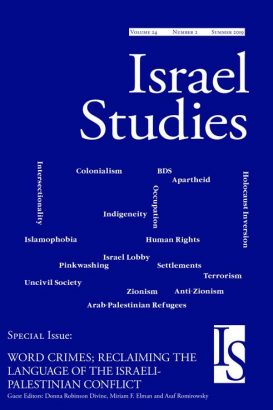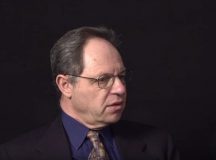Editorial Introduction: The controversy sparked by the publication of Word Crimes: Reclaiming The Language of the Israeli-Palestinian Conflict, the Summer 2019 issue of the academic journal Israel Studies, is now the subject of an extended exchange in Fathom. Cary Nelson’s review of Word Crimes has produced a sharp reply from Gershon Shafir. In turn, not only have Cary Nelson and Paula A. Treichler written a lengthy rejojnder to Shafir, but Ilan Troen, the co-editor of Israel Studies, and Donna Robinson Divine, a guest editor of the Word Crimes special, have each responded to Shafir’s critique. We hope Shafir will reply in turn and we invite other readers to continue this important discussion. The editors encourage future contributors to move the discussion on by directing their attention — critical or otherwise — to the substantive claims made in the essays that made up Word Crimes.
*
The new issue of the journal Israel Studies has caused an international controversy, initially in academia, but now stretching well beyond the ivory tower. ‘Word Crimes: Reclaiming the Language of the Israel-Palestinian Conflict’ sought to challenge what the editors and contributors considered an often delegitimising language used by often highly political and vehemently ‘anti-Zionist’ scholars to frame academic discussion of Israel and Zionism. The lead essay by Israel Studies co-editor Donna Robinson Divine can be read here. As Cary Nelson puts it in this survey of the issue and the furore it has provoked, some academics thought the editors should be ‘run out of town after being rhetorically tarred and feathered’ for the crime of blurring academic scholarship and pro-Israel Hasbara (interestingly, a mirror of the charge put by many of the contributors). While Nelson is critical of some of the articles, and some of the editing, in ‘Word Crimes’ he bemoans the polarisation between the two camps and he hopes to ‘convince some who reacted quickly that there is genuine merit in this collection’ urging the critics to ‘behave like faculty members, engaging with the substance of the essays, rather than demonising the volume’s editors’. Fathom editors welcome further responses to ‘Word Crimes’ from our readers.
At the end of her well-reasoned introduction to a special issue of Israel Studies on the topic of ‘Word Crimes,’ Donna Robinson Divine imagines that the essays will ‘return sanity to the discourse on the Israeli-Palestinian Conflict’ in the academy. I doubt that she would have made a wager on that prediction, but events since the issue’s Spring 2019 publication have clearly put any such hope to rest. A group that includes some anti-Zionist faculty members allied with the Boycott, Divestment, and Sanctions (BDS) movement, along with other accomplished scholars whose work I admire and who are sympathetic to Israel, have signed petitions or letters demanding that that the three editors — Divine, Miriam Elman, and Asaf Romirowsky — be ‘run out of town’ after being rhetorically tarred and feathered. The issue, they hyperbolically and unfairly declare, violates all standards for academic integrity; it should be withdrawn, remaining copies perhaps discarded. This polarisation of the field is unwelcome. I hope that I can convince some who reacted quickly that there is genuine merit in this collection. The goal should be to behave like faculty members, engaging with the substance of the essays, rather than demonising the volume’s editors.
Israel Studies is affiliated with the Association for Israel Studies (AIS), though AIS provides no funding to it and has no role in the journal’s operation. It does not appoint editors or supervise submissions. But AIS members can subscribe at a discount, and AIS notices are published without charge. The petition and protests against the publication of Word Crimes: Reclaiming the Language of the Israeli-Palestinian Conflict appeared so rapidly that it was clear many, including the original protest organisers, had likely not yet read the issue. Many who signed were not AIS members and certainly not subscribers. It is a depressing phenomenon in today’s academy that some faculty members will sign any petition that mirrors their politics, even if they know nothing about the underlying facts.
For some of those protesting who do have AIS affiliations, the whole manufactured brouhaha was an opportunity to wrest control of AIS from Zionists and put anti-Zionists in charge. The largest block of AIS members are Israelis; while many are highly critical of the West Bank occupation and government policy more widely, they do not seek the dissolution of the Jewish state or its replacement by a single state dominated by Palestinians. For some of the protest organisers, among them Ian Lustick, the two-state solution is already dead.
Israel studies as a field has long struggled to maintain political neutrality, and many scholars in the field concentrate on historical and cultural analysis that predates the founding of the Jewish state, thereby maintaining a more non-political academic profile. It is more challenging to write about the Israeli-Palestinian conflict without taking sides from time to time, though focusing on historical facts rather than competing narratives makes it somewhat possible. Looking at those involved suggests to me that some felt the publication of Word Crimes risked compromising the field’s apolitical posture and status. That, rather than any justifiable complaints about the essays themselves, may well have motivated some to sign.
In the interests of full disclosure, I should point out that, though I have occasionally reviewed essays submitted for publication to Israel Studies, I did not review any of the essays in Word Crimes and was not invited to contribute to the volume. I have now, however, read the entire issue carefully. I do know the editors personally; indeed I know some of the contributors and protestors alike as well. As I will make clear, I think there are tactical problems with the strategies some of the authors adopt, but there is absolutely nothing outside the academic parameters established by the anti-Zionist publications issued by prominent university presses like California, Chicago, Duke, or Minnesota. The attack on the special issue is unfounded and unwarranted; the attempt to slander its editors deplorable. Israel Studies would of course welcome the opportunity to publish rejoinders, but no other formal action is appropriate.
I will respond to the main lines of attack in detail, but I should begin by saying that the absurd, feigned outrage at the title Word Crimes — that it literally criminalises anti-Zionist writing and propaganda — needs to be registered. Of course the title is designed to be both playful and provocative, but it has a serious dimension. Divine opens and closes her introductory essay by citing perhaps the most deplorable of all anti-Israel word crimes — the slander that Israel is engaged in genocide against the Palestinians. Confronted by the fact that the Palestinian population continues to increase substantially, some have shifted their verbiage to claim to ‘slow genocide’ in an effort to sustain the slander, but it remains a false, unethical, and unprofessional accusation. The Palestinian and Israeli deaths at every stage of this long-running conflict have been deeply disturbing, but they are overshadowed by the vastly superior number of regional casualties in Iraq, Syria, and Yemen. If the term genocide retains any of its original meaning, it cannot be responsibly applied to Israel’s conduct.
Word Crimes is an effort to challenge the anti-Zionist consensus that now dominates some disciplines or sub-disciplines. It is not designed as a pro and con debate, given that in some cases one already confronts an avalanche of anti-Zionist opinion. The effort to get people to think more critically about what they may perceive to be received truths that are deceptive, misleading, or even malicious required marshalling contributions that served that goal. Nevertheless, most of the essays are sober, well-reasoned, adequately documented academic work. Thus Miriam Elman offers a careful overview of ‘Islamophobia’ that properly castigates the impulse to dehumanise and demonise Muslims and especially normalises that hostility post 9/11. Yet she also faults ‘the unhelpful way in which Islamophobia is today wielded as a blunt cudgel to stifle critical analyses of Palestinian politics’. The latter counts as the ‘word crime’ she interrogates. Similarly, John Strawson interrogates uses of ‘Colonialism’ that represent political rhetoric rather than historiography, such as those that ‘transform the Jewish population of Israel from an oppressed people fleeing persecution and genocide into an aggressive colonial settler’. ‘The use of the crude colonial slogan,’ he concludes, ‘will not help solve the urgent problems of self-determination and democracy in Palestine’. In his piece on the ‘Israel Lobby’ Natan Aridan makes it clear there is lobbying on behalf of the Jewish state; he shows, however, that its successes flow from mastering the formal and informal rules of US politics, not from ‘nefariously or unlawfully violating them’. He recalls the history of the antisemitic versions of Israel Lobby accusations, among them Ilan Pappe’s suggestion that American Jews have functioned as a fifth column.
My own sympathies do not, however, match those of all the authors. Ari Blaff writes on ‘Settlements,’ arguing accurately that they ‘have become the rallying cry for international boycotts of Israel championed by BDS activists’. ‘Refracting Palestinian grievances through settlements,’ he continues, and ignoring Palestinian intransigence, ‘an international consensus has prioritised their demonisation over the conflict’s roots’. He is certainly correct that those who object to Israel’s very existence on political, religious, or ethnic grounds are not in fact motivated by opposition to the post-1967 settlement movement. But he goes one step too far in asserting that the settlements are ‘a symptom, not a cause’. Put simply, they are both. Settlement expansion beyond those close to the green line could torpedo the two-state solution. So could annexation. I understand the anguish he feels when the Jews who returned to Hebron, one of the communities he cites, are deemed ‘illegitimate colonisers in their own ancestral lands,’ but Hebron is one of the communities that will have to be abandoned if Palestinians are to have political self-determination.
But many of the essays accurately identify the weaponisation of vocabulary that has fueled political polarisation. The principle that draws these essays together is one that many academics recognise at some level, though not always with sufficient awareness of its significance. At least in the humanities and social sciences, certain words now carry almost talismanic power. Their use in academic writing, campus debate, or the classroom eliminates the need to supply evidence or develop persuasive arguments. This is a much broader and deeper problem than that the BDS movement presents, which is why the BDS movement is not the focus of the issue. The right term — whether racism, apartheid, or settler colonialism — can carry the day on its own. The anti-Zionist lobby has largely dominated the conversation, even managing to demonise the term that designated the search for a Jewish homeland, Zionism, and widely to discredit the one accusation, antisemitism, that supporters of Israel long had in their arsenal. Word Crimes does not pretend to be comprehensive. A few contributors could not complete their pieces in time to meet the journal’s deadline, so the project should continue by exploring a still expanded vocabulary.
Contributors to Word Crimes did not have as much space either for argumentation or documentation as they would have were they writing a chapter in their own book, so they had to decide how many footnotes they could afford to provide. When I write concise essays for reference books or anthologies on topics I have already addressed in great detail elsewhere — topics like academic freedom, contingent employment, or many areas of modern poetry — I often use my available word length for my argument and omit documentation entirely. A number of the contributors to Word Crimes devoted more space to notes that I would have. Two chose to offer no documentation, which some critics, inappropriately, seem to feel discredits the whole issue. It has been pointed out to me that the fall 2018 issue of Israel Studies had six essays without footnotes, though no readers raised objections.
Writing the entry on ‘Occupation,’ Efraim Karsh, a well-established scholar, chose not to document the evidence in support of his lists of economic and cultural improvements on the West Bank since 1967. I have cited some of the same facts in my 2019 book Israel Denial: Anti-Zionism, Anti-Semitism, & The Faculty Campaign Against the Jewish State and felt it necessary to document them, in part because, unlike Karsh, I was criticising the claims made by faculty members I was naming. Some of Karsh’s evidence, like the establishment of seven West Bank universities under the Israeli occupation, whereas the Jordanian occupation saw none created, should be well known. Others, like the huge improvements in West Bank health care, are not so well known except to Palestinians themselves and some in the medical community worldwide. But Karsh is not dealing in disputed facts; the information he offers is accurate. He did make a tactical decision not to list the well-known areas like movement restraint, fragmented territorial control, lack of political self-determination, and punitive policies like house demolition that have produced so much unrest. He is presenting the alternative case about the effects of the occupation, though I think the essay would have been more effective had he balanced the positive with the negative.
Shany Mor contributes a position paper ‘On Three Anti-Zionisms’. While I have never met him, I have read and cited some of his earlier work on the Israeli-Palestinian conflict. The terms he uses here — alpha, beta, and gamma Zionism — may be unlikely to be universally adopted, and they may be intended more to be witty than definitive, but what he says about the historical transformation of Zionism is insightful and important. Among his aims is to discredit the link anti-Zionists have sought to make between opposition to Zionism before there was a Jewish state and the more recent anti-Zionism that arose once the state was founded. His second category refers to the Arab rejection of any Jewish presence in the Middle East, whereas the third identifies an Israel that ‘was created in sin and is tainted in its every action by sin’. That is what Mor classifies as gamma anti-Zionism; it holds that ‘the establishment of the State of Israel in 1948 was an unconscionable crime against humanity’. Mor seeks to help us avoid confusing these three species of anti-Zionism so that our understanding and analysis are improved. He does not do so in an effort to endorse Israeli government policy. ‘Israel as a state has its share of moral imperfections’ he writes; ‘some are the natural consequence of being a state and having to engage in difficult life or death choices and others are entirely inexcusable by any standard’. I expect to quote this piece repeatedly. What would be the point of his citing the thousands of examples of these three phases or types of Zionism? Two things matter: the classification system itself and his observations about the three types of anti-Zionism. As with the complaints the issue’s detractors have raised about other essays, the accusation about Mor’s lack of documentation has the unfortunate effect of deflecting attention from the interesting content of his essay.
Jonathan Schanzer, a former terrorism finance analyst with the US State Department and an author of several books on the Middle East, including one on Al-Qaeda and future trends in terrorism, offers a sober account of competing definitions of terrorism and the efforts by various constituencies to exploit them. He emphasises the longstanding distinction between ‘enforcement terror (launched by those in power) and agitational terror (carried out by those who aspire to power,’ making it clear that Israel targets the latter. He describes Israel’s struggle to find a fully adequate definition, the Palestinian failure to establish a definition, and the US history of mounting inadequate definitions. His essay then details the strategies and priorities these actors adopt in an objective account that does not really adopt a political vantage point.
Asaf Romirowsky has written widely about the Israeli-Palestinian conflict, including a coauthored book on Palestine refugee relief. He is thus in the same position as I have been on a number of topics, writing as an established authority. Rather than offer a skimpy sample of the vast debates about the subject, in his contribution on ‘Arab-Palestinian Refugees’ he emphasises documentation about the factual issues at stake. He has been gratuitously criticised for not citing scholarly opinion, although it requires a good deal more knowledge about his subject to cite original evidentiary sources than to cull opinions through an internet search. Here as elsewhere, the real objection is to Romirowsky’s politics and his role in coordinating Scholars for Peace in the Middle East’s (SPME) activities. That the real issue is politics is clear in the fact that a number of people have objected to Gerald Steinberg’s contribution, ‘Uncivil Society: Tracking the Funders and Enablers of the Demonisation of Israel’. A political scientist at Bar Ilan University, Steinberg has published widely on the Israeli-Palestinian conflict. Indeed, he is the premier authority worldwide on government and NGO funding of Israel delegitimisation projects. His sixty-six footnotes are designed to help readers investigate the factual issues further. Since much such funding is hidden, researching it is very difficult, but Steinberg has persevered for years.
Historian Alex Joffe, author or co-author of several books on the Middle East, provides both a historical account of the development of current human rights advocacy and a fierce but carefully reasoned critique of dominant human rights ideology as it applies to the Israeli-Palestinian conflict: ‘The concept of human rights as applied to the Palestinians deliberately blurs many legal categories. These include international humanitarian law, which aims at limiting armed conflict; international human rights law, which deals with refugees and migrants, as well as the treatment of women, children and others; and international criminal law, aimed at the conduct of individuals and regimes.’ As with many of the other essays here, the aim is to draw distinctions and thereby help us think more clearly. It is those distinctions that underwrite his political conclusions: ‘… the 1975 UN resolution that declared that Zionism is racism, effectively converting the basic concept of Jewish autonomy and sovereignty into a human rights abuse against the Palestinians and the global order.’
A number of contributors have comparable expertise. Corinne Blackmer writes on ‘Pinkwashing,’ a subject she has addressed before. Moreover, she has a single-author book in progress, which I have read, about LGBTQ engagement in anti-Zionist politics. Like all of us who write about ‘pinkwashing’— I’ve done so twice — Blackmer has to confront the exceptionally twisted logic that seeks to convert an Israeli virtue, well-established gay rights, into a liability. The height of argumentative convolution is reached in Jasbir Puar’s essays and book chapter, a topic I have addressed at considerable length. Ilan and Carol Troen write on ‘Indigeneity’. Ilan Troen is one on the founding figures of Israel studies and has been writing about indigeneity for years. He and his co-author trace the competing and surprisingly varied contemporary efforts to invent histories of indigeneity to gain political advantage and then offer the depressing but necessary conclusion: ‘Hitching a ride on this concept and using it indiscriminately obscures the complex issues that have to be addressed if the parties conflicting claims are ever to be adjudicated.’ Lesley Klaff, who is an editor of The Journal of Contemporary Antisemitism, also writes about a subject, ‘Holocaust Inversion,’ that she has addressed in full-length essays that I cite in my own work. As she points out here, Holocaust inversion has a dual effect: ‘By comparing Israel’s behavior towards the Palestinians with that of the Nazis towards the Jews, any wrongdoing on the part of Israel is magnified and exaggerated and the crimes and atrocities the Nazis inflicted on the Jews are diminished.’ When combined with her detailed history of the origin and evolution of Holocaust inversion, this straightforward and objective conclusion highlights the challenge that all who are inclined to use Holocaust analogies should confront.
The attack on the credentials of the special issue’s authors is at best disingenuous. They all have a history of writing about the Israeli-Palestinian conflict, though one (Ari Blaff) is a global affairs graduate student at the University of Toronto who has written for several news outlets. Most have previously written about the specific topic they address, though that is not always the best standard to apply in building such a volume. Sometimes you ask people to move out of their more narrow and familiar comfort zone to take on a related topic within the broader subject area. That helps generate some original thinking, rather than just a summary of peoples’ earlier work.
Some of the protestors were agitated that ‘nonspecialists’ were invited to contribute. Over a period of years, when I several times debated the conservative activist David Horowitz in public, he argued that you could only validly write on a subject if you were trained in it in graduate school. Among my 33 books are several each on higher education, the Spanish Civil War, and the Israeli-Palestinian conflict. My PhD in literature did not formally prepare me in any of these subjects. Some faculty members stay within a single area their entire careers; others acquire new interests and either move on or add them to their profile. They read in the new area, attend conferences, conduct original research, discuss the issues with colleagues, and eventually draft academic publications. Of course at first no one credits you with any expertise when you enter a new field. And I suppose for David Horowitz my three books on the Israeli-Palestinian conflict — a fourth should be out later this year — and several dozen essays still leaves me unqualified. But his disapproval does not keep me awake at night. Nor would any comparable judgment from those, including petition signers who’ve never written anything about Israel, who have mounted the campaign against this special issue. Why the volume’s detractors consider themselves appointed to police the discipline in the way they are seeking to do is difficult to say, though the range of contributors appears to violate their sense of who the canonical, authorised Israel studies scholars are. Even fluency in multiple languages, which is a tremendous asset, will not guarantee that you will produce compelling insights, though one meets mediocre scholars who would like to think so. There is more hollow posturing by people of all political persuasions about qualifications in Middle East and Israel studies than in many other fields. In all areas of academic life, the challenge is to exercise judgments about the research and insights themselves. In the case of Word Crimes, I believe the actual results are of great interest and utility and do not justify the hostility they have received.
Happily, there are many new ideas here, both from those who have taken a fresh look at their previous work and from those who take on somewhat different subject matter. Thus Donald Ellis writes on ‘Apartheid’ not so as to summarise the existing debates, numerous examples of which are online, but rather to explore how efforts to redefine and extend the concept’s meaning have shaped its impact. He is thus applying his expertise as a widely published communications scholar to give us additional insight into the politics and semantics of this dynamic. Despite efforts to brand Israel an apartheid state, he reminds us, ‘apartheid is a system of institutionalised racial segregation and discrimination,’ whereas ‘the Israeli-Palestinian conflict is not about racial segregation but about land rights and occupation’. It is worth noting that Ellis’s blog includes a great number of his concise essays about the Israeli-Palestinian conflict. I have been reading those for several years.
Among the contributions sure to be controversial are Gabriel Brahm’s on ‘Intersectionality’ and Thane Rosenbaum’s on ‘Zionism’. Brahm’s account of the benefits of traditional uses of intersectionality reliably summarises those who have come before him. His critique of its current abuse combines wit and something more like vigorous condemnation. He is admirably satiric when he describes ‘suffering . . . tirelessly excavated by bureaucrats whose real job is resentment management’. And he is at least close to being justified in saying ‘intersectionality is the sum-of-all-virtue-signals,’ the ‘master-signifier of concern for every-injustice-all-at-once,’ though he recognises it skips the injustice of the oldest hatred. Where he is on much shakier ground is in generalising about this sequence:
In a period when African Americans (of both genders) were classified as property and women across the board (of all races) were legally restricted from owning property and not yet allowed to vote in the United States, black women were doubly oppressed. Moreover, nowadays one certainly must add that black lesbians were trebly subordinated, disabled Third World women of color even more so, and non-white Muslim transsexuals (almost entirely officially erased at the time) suffered most of all. For this is the logic of intersectionality in practice: one is ethically bound to constantly take account of every variation in the vast menagerie of prejudice.
This mixes warranted sarcasm with the voice of an aggrieved white male. Where Brahm is on point is in warning that anti-Zionism is corrupting some components of contemporary feminism. But he is wrong to assert that the feminism tout court is allied with BDS and lost to progressive liberalism.
Thane Rosenbaum is a complex case. A New York University law professor who has written several novels, he is notably flamboyant in addressing the Israeli-Palestinian conflict. ‘Zionism is the one nationalism that dare not speak its name’ is obviously witty but overstated, but the claim that ‘Arab-Israeli parties . . . unleash oppositional invective that would constitute treason in most democratic societies’ is actually irresponsible, especially from a law professor. And ‘arguably no other democracy would allow anything approaching some of the seditious rantings found in Ha’aretz’ is no better. Calling Zionism ‘a cleansing agent for Jew-hatred everywhere’ takes an important point and undercuts it rhetorically. Rosenbaum is often on target here, but his lapses into rhetorical overkill do damage to the overall project. Judicious editing would have helped.
These possible weaknesses notwithstanding, Word Crimes performs a considerable service by gathering these frequently thoughtful essays together and highlighting a genuine and serious problem in the academy. Even knowledgeable people in Israel studies should learn a great deal from them. It is past time to reject the misguided assault on the editors and engage the dialogue they have initiated.






































There is no “West Bank occupation.”
Read “The Mandate for Palestine.”
To advocate Israel’s suicidal yielding of territory to a genocidal enemy does not require falsification of the fact of Israel’s legal territorial entitlements under The Mandate for Palestine, Article 80 of the UN Charter, the doctrine of Uti possidetis juris, Security Council Resolution 242, to mention just a few.